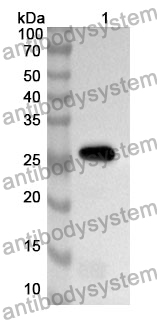Catalog No.
PHD23001
Species reactivity
Human
Host species
Rabbit
Isotype
IgG
Clonality
Polyclonal
Immunogen
E. coli - derived recombinant Human IFNAR1 (Lys28-Asn227).
Tested applications
ELISA: 1:4000-1:8000, IHC: 1:50-1:100, WB: 1:1000-1:4000
Target
Interferon alpha/beta receptor 1,Cytokine receptor family 2 member 1,Cytokine receptor class-II member 1,CRF2-1,IFN-R-1,IFNAR1,IFNAR,IFN-alpha/beta receptor 1,Type I interferon receptor 1
Purification
Purified by antigen affinity column.
Accession
P17181
Applications
ELISA, IHC, WB
Form
Liquid
Storage buffer
0.01M PBS, pH 7.4, 50% Glycerol, 0.05% Proclin 300.
Stability and Storage
Use a manual defrost freezer and avoid repeated freeze thaw cycles. Store at 2 to 8°C for frequent use. Store at -20 to -80°C for twelve months from the date of receipt.
Interferon-epsilon, an estrogen-induced type I interferon, is uniquely exploited by Neisseria gonorrhoeae via effects on sialic acid metabolism., PMID:40494348
Trem2 regulates microglial migratory responses via type I interferon signaling during photoreceptor degeneration., PMID:40468324
Lichenoid graft-versus-host disease shows a high interferon score, with IFNAR1 inhibition preventing skin inflammation., PMID:40439472
Evolution of Zika virus in Rag1-deficient mice selects for unique envelope glycosylation motif mutants that show enhanced replication fitness., PMID:40291117
Type I IFN receptor blockade alleviates liver fibrosis through macrophage-derived STAT3 signaling., PMID:40260261
A novel approach using IFNAR1 KO mice for assessing Akabane virus pathogenicity and vaccine efficacy., PMID:40209629
Type I interferon autoantibody footprints reveal neutralizing mechanisms and allow inhibitory decoy design., PMID:40111224
Virus-like particle vaccine with authentic quaternary epitopes protects against Zika virus-induced viremia and testicular damage., PMID:40013767
Sustained Interferon Signature Suppression With Anifrolumab in a Patient With STING-Associated Vasculopathy with Onset in Infancy Refractory to JAK Inhibitor and Dazukibart Therapy., PMID:40007227
Pair combinations of human monoclonal antibodies fully protected mice against bunyavirus SFTSV lethal challenge., PMID:39888973
Caerin 1.1/1.9-mediated antitumor immunity depends on IFNAR-Stat1 signalling of tumour infiltrating macrophage by autocrine IFNα and is enhanced by CD47 blockade., PMID:39885296
Type I Interferon Targets Alveolar Macrophages to Promote Bacterial Pneumonia after Viral Infection., PMID:39879546
Epigenetic age acceleration and methylation differences in IgG4-related cholangitis and primary sclerosing cholangitis., PMID:39819503
Harnessing defective interfering particles and lipid nanoparticles for effective delivery of an anti-dengue virus RNA therapy., PMID:39817192
Vaccination with a Replication-Dead Murine Gammaherpesvirus Lacking Viral Pathogenesis Genes Inhibits WT Virus Infection., PMID:39803443
Vaccination with a Replication-Dead Murine Gammaherpesvirus Lacking Viral Pathogenesis Genes Inhibits WT Virus Infection., PMID:39772237
IFN-I promotes T-cell-independent immunity and RBC autoantibodies via modulation of B-1 cell subsets in murine SCD., PMID:39656114
Vaccine candidates based on MVA viral vectors expressing VP2 or VP7 confer full protection against Epizootic hemorrhagic disease virus in IFNAR(-/-) mice., PMID:39508577
Single-cell transcriptome profiling identifies the activation of type I interferon signaling in ossified posterior longitudinal ligament., PMID:39441507
Normalized Interferon Signatures and Clinical Improvements by IFNAR1 Blocking Antibody (Anifrolumab) in Patients with Type I Interferonopathies., PMID:39441221
[Translated article] Use of Anifrolumab in Systemic Lupus Erythematosus, Cutaneous Lupus Erythematosus, and Other Autoimmune Dermatoses., PMID:39389344
Physiology-based pharmacokinetic model with relative transcriptomics to evaluate tissue distribution and receptor occupancy of anifrolumab., PMID:39360565
A sensitive assay for measuring whole-blood responses to type I IFNs., PMID:39312669
Microglial cGAS-STING signaling underlies glaucoma pathogenesis., PMID:39190350
Co-expression of VP2, NS1 and NS2-Nt proteins by an MVA viral vector induces complete protection against bluetongue virus., PMID:39072326
Toll-like Receptor Homologue CD180 Ligation of B Cells Upregulates Type I IFN Signature in Diffuse Cutaneous Systemic Sclerosis., PMID:39063175
Three SARS-CoV-2 spike protein variants delivered intranasally by measles and mumps vaccines are broadly protective., PMID:38961063
A replication-deficient gammaherpesvirus vaccine protects mice from lytic disease and reduces latency establishment., PMID:38914546
Safety concern of recombination between self-amplifying mRNA vaccines and viruses is mitigated in vivo., PMID:38894543
A novel function of STAT3β in suppressing interferon response improves outcome in acute myeloid leukemia., PMID:38806478
Structural basis for the recognition of IFNAR1 by the humanized therapeutic monoclonal antibody QX006N for the treatment of systemic lupus erythematosus., PMID:38649079
Type I interferon blockade with anifrolumab in patients with systemic lupus erythematosus modulates key immunopathological pathways in a gene expression and proteomic analysis of two phase 3 trials., PMID:38569851
Safety, Tolerability, Pharmacokinetics, and Immunogenicity of the Anti-IFNAR1 Monoclonal Antibody QX006N: A First-in-Human Single Ascending Dose Study in Healthy Chinese Volunteers., PMID:38148466
USP18 enhances dengue virus replication by regulating mitochondrial DNA release., PMID:37978268
Differential expression of Type I interferon and inflammatory genes in SARS-CoV-2-infected patients treated with monoclonal antibodies., PMID:37904704
Transgenic mouse models support a protective role of type I IFN response in SARS-CoV-2 infection-related lung immunopathology and neuroinvasion., PMID:37874678
Replication-dead gammaherpesvirus vaccine protects against acute replication, reactivation from latency, and lethal challenge in mice., PMID:37808844
A next-generation intranasal trivalent MMS vaccine induces durable and broad protection against SARS-CoV-2 variants of concern., PMID:37796985
Severity of SARS-CoV-2 infection in children with inborn errors of immunity (primary immunodeficiencies): a systematic review., PMID:37559153
Role of Anifrolumab in Refractory Cutaneous Manifestations of Lupus Erythematosus: A Case Series and Literature Review., PMID:37378095
Mitochondrial dysfunction and type I interferon signaling induce anxiodepressive-like behaviors in mice with neuropathic pain., PMID:37327964
Transient Blockade of Type I Interferon Signalling Promotes Replication of Dengue Virus Strain D2Y98P in Adult Wild-Type Mice., PMID:37112795
Systemically inoculated adjuvants stimulate pDC-dependent IgA response in local site., PMID:36935091
Type I IFN Receptor Signaling on B Cells Promotes Antibody Responses to Polysaccharide Antigens., PMID:36458995
Data supporting the roles of BAP1, STING, and IFN-β in ISGF3 activation in ccRCC., PMID:36426057
Macrophage Depletion Reactivates Fecal Virus Shedding following Resolution of Acute Hepatitis A in Ifnar1-/- Mice., PMID:36354341
Human type I IFN deficiency does not impair B cell response to SARS-CoV-2 mRNA vaccination., PMID:36342455
The Influenza-Induced Pulmonary Inflammatory Exudate in Susceptible Tpl2-Deficient Mice Is Dictated by Type I IFN Signaling., PMID:36227523
Influence of Zika virus 3'-end sequence and nonstructural protein evolution on the viral replication competence and virulence., PMID:36149812
Belimumab or anifrolumab for systemic lupus erythematosus? A risk-benefit assessment., PMID:36119023

